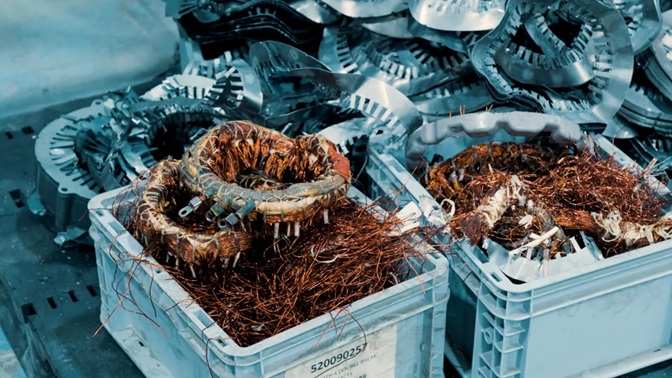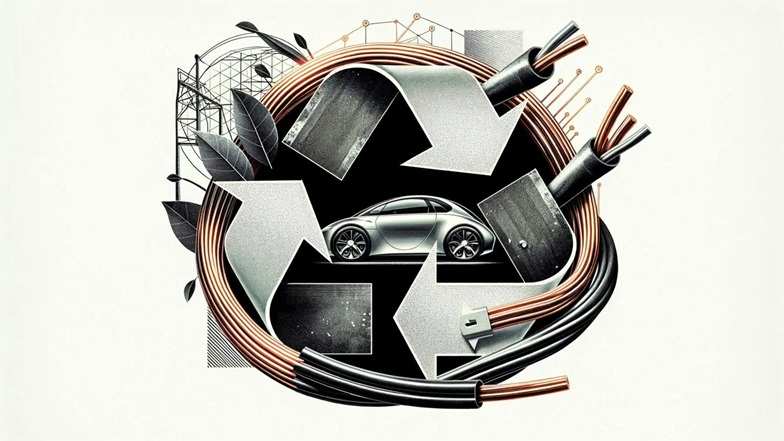Copper is a cornerstone of modern energy infrastructure, powering electric vehicles (EVs), renewable energy systems, and countless other technologies essential for the clean energy transition. As global demand for copper skyrockets, Cyclic Materials, a cutting-edge cleantech company, is stepping up to meet the challenge sustainably. By partnering with Swiss mining giant Glencore, Cyclic Materials is pioneering a new era of copper recycling, reducing waste and minimizing environmental impact. Let’s dive into this innovative collaboration and its potential to reshape the copper supply chain.

The Partnership at a Glance
Cyclic Materials has signed a multi-year agreement with Glencore to supply recycled copper, marking a significant step toward sustainable copper production. The deal focuses on extracting copper from electronic scrap—like discarded EV motors and wind turbines—and refining it for reuse. This recycled copper, an estimated 10,000 metric tons, will be sent to Glencore’s Horne Smelter and Canadian Copper Refinery. There, it will be processed into copper cathode, a refined form of copper that can be used in new technologies driving the clean energy revolution.
This approach not only meets rising demand but also avoids the environmental pitfalls of traditional mining, such as habitat destruction, carbon emissions, and resource depletion.
Why This Collaboration Matters
Copper is indispensable in building a sustainable future, from wiring EVs to powering renewable energy grids. However, traditional mining methods are time-consuming, costly, and environmentally damaging. This is where Cyclic Materials and Glencore come in, adopting a circular economy model that emphasizes reuse over extraction. By tapping into existing materials, the companies aim to reduce waste, conserve resources, and cut down on the carbon footprint of copper production.
Kunal Sinha, Glencore’s global head of recycling, emphasized the importance of this partnership:
“Cyclic Materials is filling a critical gap in the market. Their focus on rare earth recovery is exactly what we need to build a circular supply chain for critical materials.”
Cyclic Materials: Closing the Loop on Copper
Cyclic Materials is at the forefront of recycling metals crucial for clean energy technologies. The company specializes in recovering copper from electronic scrap, a valuable resource often overlooked in the quest for new raw materials. This innovative process extracts metals from discarded products—such as wind turbine components and EV motors—and refines them to meet the industry’s high standards.
CEO Ahmad Ghahreman called the agreement a key milestone for the company:
“We are excited to be partnering with Glencore on the recycling of copper materials. This is a significant milestone in establishing key partners to purchase our recycled materials and close the loop for all critical materials we will produce.”
The Environmental and Economic Impact
The traditional mining industry has long been associated with negative environmental impacts, including deforestation, water pollution, and high greenhouse gas emissions. Recycling copper offers a solution that addresses these issues head-on:
- Reduced Waste: Extracting copper from electronic scrap helps divert e-waste from landfills.
- Lower Carbon Footprint: Recycling uses significantly less energy compared to mining and refining raw copper.
- Cost-Effectiveness: Repurposing existing materials can reduce production costs and time.
This sustainable approach not only benefits the environment but also positions both companies as leaders in the clean energy transition.

From Scrap to Sustainability: How It Works
Cyclic Materials’ process begins with sourcing discarded electronic components containing copper. These materials are refined into high-quality copper that meets industry standards. The recycled copper is then shipped to Glencore’s facilities, where it undergoes further processing into copper cathode. This finished product can be used in manufacturing EVs, renewable energy systems, and other critical technologies.
The first shipments are expected to begin in late 2025, signaling a major step forward in creating a sustainable supply chain for critical materials.
A Circular Economy for a Cleaner Future
The collaboration between Cyclic Materials and Glencore exemplifies the growing shift toward a circular economy. In this model, resources are reused, refurbished, and recycled rather than discarded, creating a closed-loop system that minimizes waste. For industries reliant on critical materials like copper, adopting this approach is essential for long-term sustainability.
By focusing on rare earth recovery, Cyclic Materials is addressing a critical need in the market, ensuring that essential resources are not only available but also responsibly sourced.
Why Recycling is the Future of Copper Production
The demand for copper is projected to surge in the coming years, driven by the rapid adoption of clean energy technologies. However, relying solely on traditional mining to meet this demand is neither sustainable nor practical. Recycling offers a scalable, efficient alternative that aligns with global efforts to combat climate change.
Key advantages of copper recycling include:
- Meeting Demand: Recycling can supplement mined copper to meet growing industrial needs.
- Enhancing Sustainability: By reducing the reliance on mining, recycling supports environmental conservation.
- Promoting Innovation: Partnerships like the one between Cyclic Materials and Glencore pave the way for new technologies and methods in metal recovery.
The Broader Context: Clean Energy and Resilience
As the world transitions to renewable energy and electric transportation, the role of metals like copper becomes increasingly important. Innovations in recycling not only support this transition but also enhance energy resilience. For homeowners interested in sustainable energy solutions, now is an excellent time to explore technologies like solar panels and battery storage systems. Platforms like EnergySage can help connect you with trusted solar installers, ensuring you get high-quality solutions at competitive prices.
The partnership between Cyclic Materials and Glencore is more than just a business agreement—it’s a blueprint for a more sustainable future. By prioritizing recycling over traditional mining, these companies are demonstrating how industries can evolve to meet modern challenges without compromising the planet.
As the first shipments of recycled copper roll out in 2025, this collaboration promises to set a new standard for how we source and use critical materials in the clean energy era. If more companies follow their lead, a circular economy for metals could become the norm, driving a greener, more efficient future for all.
Related Post
